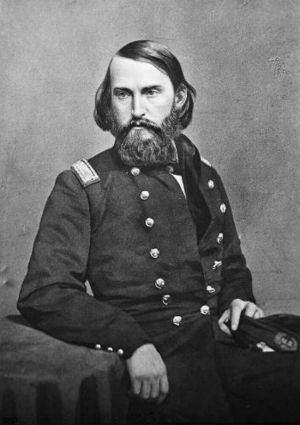John T. Croxton facts for kids
Quick facts for kids
John Thomas Croxton
|
|
|---|---|

John T. Croxton
|
|
| United States Ambassador to Bolivia | |
| In office April 9, 1873 – April 16, 1874 |
|
| President | Ulysses S. Grant |
| Preceded by | Leopold Markbreit |
| Succeeded by | Robert M. Reynolds |
| Personal details | |
| Born | November 20, 1836 Paris, Kentucky |
| Died | April 16, 1874 (aged 37) La Paz, Bolivia |
| Resting place | Paris Cemetery, Paris, Kentucky |
| Military service | |
| Allegiance | United States of America |
| Branch/service | United States Army Union Army |
| Years of service | 1861–1865 |
| Rank | |
| Commands | 4th Kentucky Infantry Regiment 2nd Brigade, 3rd Division, XIV Corps 1st Brigade, 1st Division, Cavalry Corps, Army of the Cumberland |
| Battles/wars | American Civil War |
John Thomas Croxton (born November 20, 1836 – died April 16, 1874) was an important person in American history. He was a lawyer, a general in the United States Army during the American Civil War, and later a diplomat for the U.S. government after the war.
Early Life and Career
John Croxton was born near Paris, Kentucky, in a rural area called Bourbon County. He was the oldest of twelve children. His father was a wealthy farmer who owned a large farm and enslaved people.
In 1857, John graduated with high honors from Yale University. After college, he studied law and became a lawyer. He also joined a group called the Freemasons.
In 1858, Croxton taught law in Mississippi. The next year, he returned to Kentucky and started a successful law business in Paris. He also owned a small farm. He married Catherine Rogers and they had three daughters. John strongly believed that enslaved people should be freed. This idea was different from what many in his family thought.
Civil War Service
In October 1861, as the American Civil War became more serious, President Abraham Lincoln chose Croxton to be a lieutenant colonel in the 4th Kentucky Mounted Infantry. His first big fight was at the Battle of Mill Springs.
He later became a colonel in early 1862 and fought at the Battle of Perryville. On September 19, 1863, his group of soldiers fought against Confederate cavalry led by Nathan Bedford Forrest. This battle started the Battle of Chickamauga, where Croxton was injured in the leg. He was also wounded in the leg at the Battle of Nashville.
In 1864, when he was only 27, he was promoted to brigadier general. He led a cavalry group in the Army of the Cumberland during the Atlanta Campaign. His soldiers were often fighting the enemy during this time.
Croxton's cavalry was very active in Alabama during the last months of the war. On April 4, 1865, his 1,500 men took control of Tuscaloosa. This helped the Union army control central Alabama and destroyed one of the Confederacy's last major supply centers. They burned many buildings at the University of Alabama and much of the town's factories and storage areas.
On April 23, 1865, Croxton's troops fought the Battle of Munford near Talladega, Alabama. They defeated several hundred Confederate soldiers. This battle is thought to be the last battle of the Civil War east of the Mississippi River.
After the War
After the war ended, Croxton was given the honorary rank of major general. He was then put in charge of the District of Southwest Georgia as a temporary governor. He left this role on December 26, 1865.
After leaving the army, Croxton went back to being a lawyer in Kentucky. He became a strong supporter of the Republican Party. In 1872, President Ulysses S. Grant appointed him as the U.S. Minister to Bolivia. This meant he was the top U.S. diplomat in Bolivia. He moved his family to La Paz, Bolivia.
John Thomas Croxton died in Bolivia in April 1874 from a lung illness, which was called "consumption" at the time (now known as tuberculosis). His body was sent back home to Kentucky. He is buried at Paris Cemetery in Paris, Kentucky.
 | Emma Amos |
 | Edward Mitchell Bannister |
 | Larry D. Alexander |
 | Ernie Barnes |

